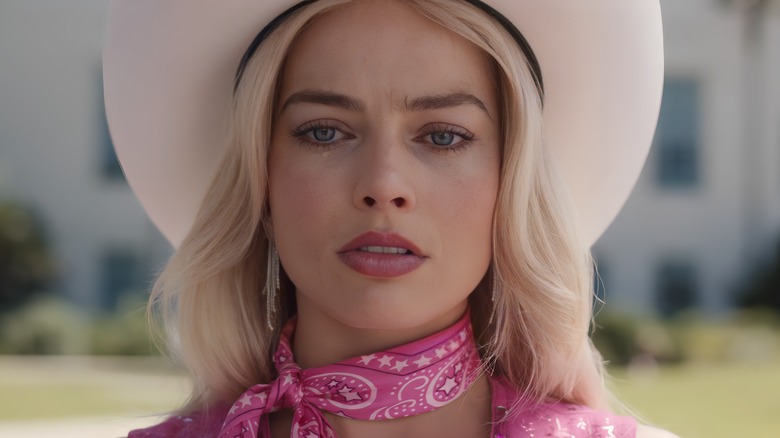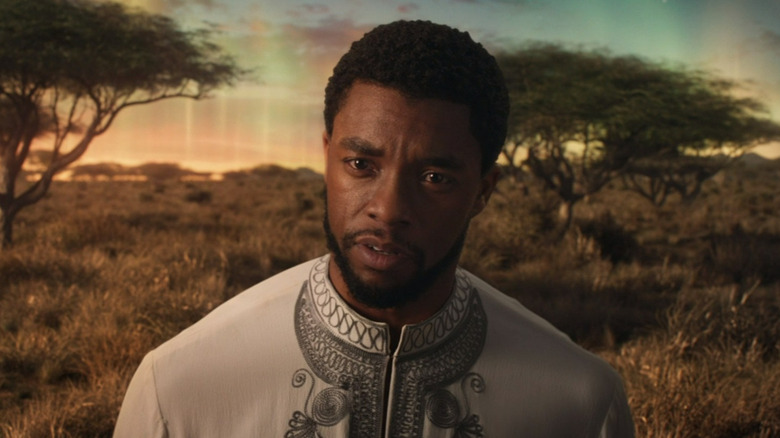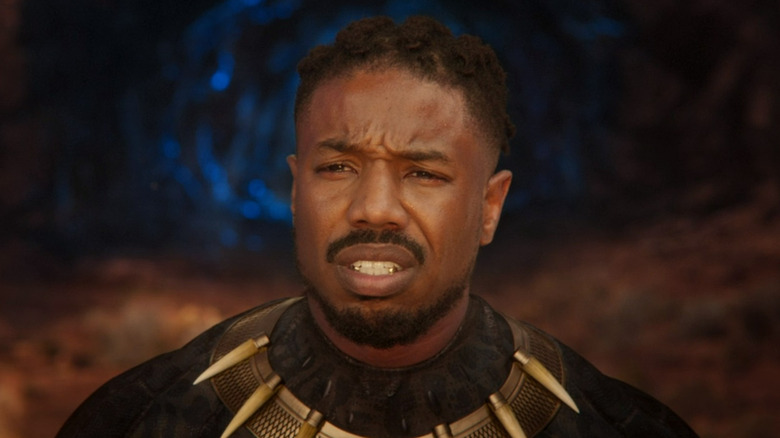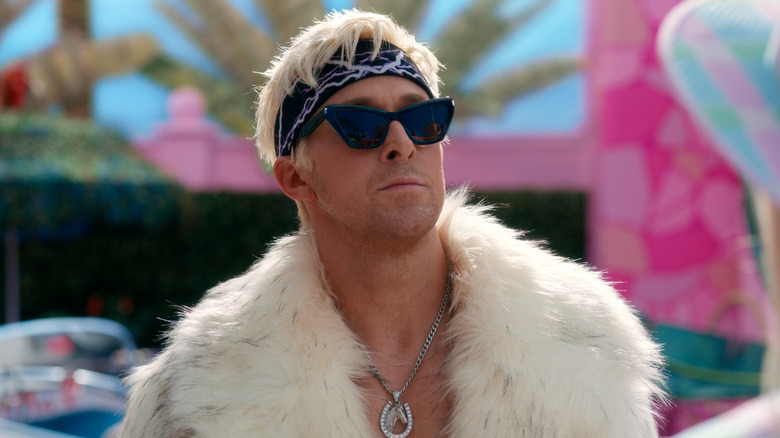Barbie & Black Panther May Be More Alike Than You Think According To TikTok
The internet loves to connect disjointed dots. In recent weeks, Warner Bros. released Greta Gerwig's "Barbie," a fantastical comedy starring Margot Robbie and Ryan Gosling that shines a pink spotlight on the harm embedded in patriarchal gender roles. The online hivemind quickly clocked the project as being similar to another popular film: Ryan Coogler's MCU blockbuster, "Black Panther." No, seriously.
In a clip from "Rooster Teeth Podcast" posted to TikTok, Andrew Rosas jokingly referred to "Barbie" as "'Black Panter' for white b****es." Another creator, Alex Rabinowitz of Pop Culture Brain fame, broke down the similarities between the two properties on his own TikTok, saying, "I love that movie about a hero who lives in a secret land full of magic and powerful women. Their realm has been intentionally secluded from the rest of the world. Though, you can enter this secret realm via certain modes of transportation."
Immediately, Rabinowitz isn't wrong. "Black Panther" takes place in the fictional land of Wakanda, a highly-advanced kingdom hidden from the modern world. Conversely, "Barbie" is set in Barbieland, a magical kingdom hidden from the modern world. Wakanda is home to an elite force of skilled women known as the Dora Milaje, and it flourishes under the scientific genius of its princess, Shuri (Letitia Wright). On the flip side, Barbieland is home to a matriarchal society where women can achieve anything they desire. Entry to Wakanda requires technology to pass through its forcefield, and entry to Barbieland requires knowledge of its Los Angeles-based doorway and access to rollerblades.
Barbie and Black Panther share core themes of societal woes
The similarities continue. Rabinowitz also notes, "After leaving and interacting with the outside world, the hero is faced with questions about their society and why its systems are set up the way they are." In "Black Panther," T'Challa (Chadwick Boseman) struggles with the truth that he and his fellow Wakandans possess the resources and knowledge required to provide stability that is not universally accessible for African Americans in the United States. In "Barbie," Barbie (Margot Robbie) struggles with how poorly women are treated under America's oppressive and violent patriarchal structure.
A key difference here, however, is that T'Challa is initially at odds with his own people over his desire to extend an olive branch beyond Wakanda's borders. All the Barbies in Barbieland are of one mind in their wish to secure the empowerment of women, both young and old.
Rabinowitz then mentions, "A usurper with knowledge of the outside world takes over the magical land, and he has all kinds of new ideas about how they should run things. His sudden access to power would change the outside world as well." In Ryan Coogler's film, the usurper is Erik Killmonger (Michael B. Jordan), the abandoned son of an estranged Wakandan royal whose life was negatively altered by the failings of his homeland's leadership. In Greta Gerwig's film, the usurper is Ken (Ryan Gosling), Barbie's lonely boyfriend, who feels his only purpose under Barbieland's current social structure is to serve as second-class arm candy. Killmonger's sudden authority in Wakanda gives rise to a global rebellion against colonizing oppressors. Ken's alterations to Barbieland force Mattel to sell Mojo Dojo Casa Houses.
Barbie and Black Panther want to make the world a better place
According to Alex Rabinowitz, the two films even share a strikingly similar conclusion. "In the end, the hero confronts the usurper, who chooses to give up on his own accord, thus restoring the balance of power," he commented. "The hero convinces everyone that the usurper's ideas were mostly wrong, but they do incorporate some of his principles to make a more just society." In "Black Panther," Killmonger loses a key physical battle against T'Challa. Instead of allowing the usurped king of Wakanda to provide him with life-saving medical aid, he chooses death over imprisonment. In the aftermath, T'Challa acknowledges that Killmonger's tragedy was one of Wakanda's own making. He opens his kingdom's borders so that further pain might be avoided.
In "Barbie," Ken loses a key political battle against Barbie. Rather than lash out, he relinquishes his rebellion, saying, "To be honest, when I found out the patriarchy wasn't about horses, I lost interest." At the film's conclusion, Barbie admits Ken's struggle for purpose was partially her fault, so Barbieland begins the long and tedious journey to gender equality.
Rabinowitz finishes his side-by-side comparison by noting, "The hero then takes steps to become a presence in the outside world." In the "Black Panther" ending, T'Challa launches well-funded outreach programs for underprivileged African-American communities. At the end of "Barbie," Barbie sacrifices her doll-hood to become human. She tells the ghost of Ruth Handler (Rhea Perlman), "I want to be a part of the people that make meaning, not the thing that is made."
Barbie and Black Panther suffer from similar problems
There's another element that "Black Panther" and "Barbie" have in common; an ironic reality that neither Rooster Teeth nor Pop Culture Brain address in their respective coverage. Both films suffer a significant blow to their core thematic messaging since their usurper characters are objectively hot men. Killmonger and Ken are intentionally sympathetic figures in that they both suffer legitimate grievances under the otherwise careful watch of supposedly good systems. That's why audiences care about their wants ... or rather, it's supposed to be the reason why.
Instead, it seems as though the online conversation around these two films often gravitates toward the thrill of seeing Michael B. Jordan and Ryan Gosling do unquestionably bad things while also being charismatic and sexy. To make the discourse more complicated, both talents give incredible performances in their respective roles. And since it can sometimes be very easy to misconstrue critical praise for acceptance of narrative action, "Black Panther" and "Barbie" find their subjects of discussion diluted by cries for redemption, even if it doesn't make sense for the stories being told. And, in fairness, Gosling's Ken finds himself at the beginning of such an arc, but Jordan's Killmonger doesn't — he's beyond redemption.
There's no moral here, only an observation. At least it's more fun than comparing James Cameron's "Avatar" franchise against Disney's "Pocahontas."



